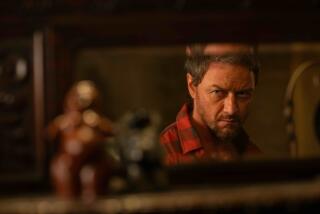Review: ‘A War’ effectively shows the havoc that combat wreaks at home and abroad
- Share via
“A War” is a film done exactly right about a situation gone horribly wrong. A powerful foreign language Oscar finalist, it proves yet again that agonizing moral dilemmas make for the most effective cinema.
Written and directed by Denmark’s Tobias Lindholm, “A War” joins Susanne Bier’s taut 2004 “Brothers” as a superb drama dealing with collateral damage resulting from that country’s troop deployment as peacekeepers in Afghanistan.
See more of Entertainment’s top stories on Facebook >>
“It has defined my generation, more than anything else,” the director has said, “that we have sent young men to wars that haven’t been about defending Denmark’s borders but are based on abstract political choice.”
Lindholm, who did the crackerjack “A Hijacking” and wrote for the TV sensation “Borgen,” has the ideal creative temperament for depicting the havoc war wreaks both at home and abroad. His style neither flinches nor overdramatizes but rather creates difficult situations that are intense and uncomfortably real.
With “A War,” Lindholm has written a provocative story whose ever-increasing complications have a way of taking you by surprise. Showing how the pervasive destructiveness of war allows small, reasonable decisions to catapult the unwary into the heart of a chaotic nightmare, it explores whether doing the right thing can lead to terrible wrong, whether caring for human life is even possible in the midst of savage combat.
In the center of this dilemma is Danish company commander Claus Pedersen (Lindholm regular Pilou Asbaek), who is unequivocally characterized as a good officer and a caring human being, someone who worries about protecting Afghans as well as his men.
Almost immediately, however, disaster strikes a soldier under Pedersen’s command, leaving the rest of his men distraught and one particular soldier, the skittish Lasse (Dulfi Al-Jabouri), an emotional wreck. To help share the burden with his squad, Pedersen decides to go out on daily patrols with the men rather than stay back at headquarters.
Pedersen has left wife Maria (Tuva Novotny) and three small children in Denmark. Despite frequent phone calls from Afghanistan, it is tough for those left behind, and oldest son Julius has begun to act out in ways that Maria manages to handle though the situation is frustrating and difficult.
Also handling things as well as they can are the soldiers in Afghanistan’s Helmand Province, who in fact are portrayed as trying and largely succeeding at doing things the right way. They have a capable translator, they attempt to cooperate with the local people and when decisions need to be made Pedersen thinks them through and makes the sensible choice.
But it is almost a rule in combat zones that situations can change from boredom to hyper intense in a heartbeat, and suddenly Pedersen and his men are thrust into the sheer fog of war, chaos of combat, where life and death choices have to be made under the worst conditions imaginable.
Lindholm is a bear for authenticity, and he and cinematographer Magnus Nordenhof Jonck make use of tight, handheld camerawork to make us feel we are in the middle of the story.
Though “A War” was shot in Turkey, Lindholm used Afghan refugees as extras, and, except for key actors like Dar Salim as Pedersen’s old friend and second in command Najib, the soldiers in the unit were played by soldiers who had in fact served in Afghanistan.
More than physical authenticity, “A War” captures the psychological veracity of men in combat, the agony that results from having to decide what’s allowable to save a life in a combat zone, and how individuals and society react when understandable impulses lead to unacceptable results.
More to Read
Only good movies
Get the Indie Focus newsletter, Mark Olsen's weekly guide to the world of cinema.
You may occasionally receive promotional content from the Los Angeles Times.











